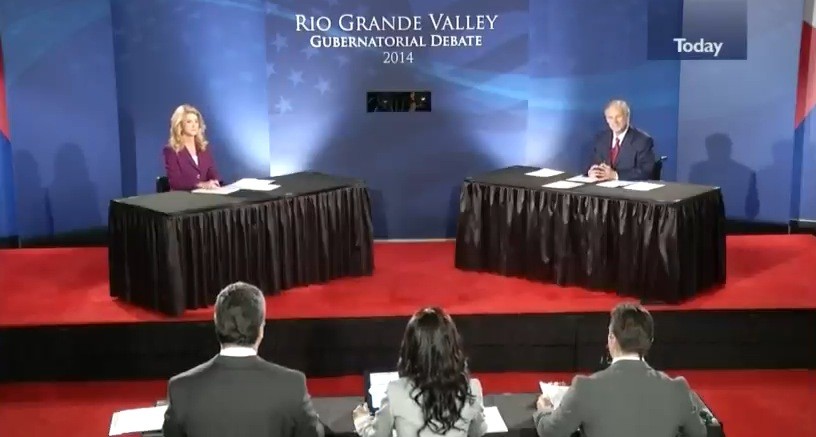(via)
The first televised gubernatorial debate had the potential to get good. At one point, Republican candidate Greg Abbott and Democratic candidate Wendy Davis were given a chance to ask each other questions. Well, just one question each.
Abbott’s question to Davis: did she regret voting for President Barack Obama?
And Davis to Abbott: Would Abbott announce right then and there that he would drop his appeal of the recent school finance ruling?
As rollicking and engaging as that could have been, most of the evening was your run-of-the-mill, back-and-forth debate, with each candidate staying robotically on message and getting one minute to answer questions from the moderator, followed by 45 seconds to respond to one another.
The topics covered included border security, abortion, public education, Medicaid Expansion, voter identification laws, anti-Hispanic rhetoric, raising the minimum wage, veteran health care, and the death penalty, to name a few. The "debate" did get a heated a few times, centering mainly around public education, but there were few one-liners between the two.
Davis, running as a Democrat in a state that hasn't elected one to a statewide office in 20 years, worked hard to attach her opponent, while Abbott, the frontrunner in the race, almost seemed to ignore her and avoided any heated discussion. Still, each candidate’s responses sounded more like rehearsed campaign ads than any meaty, analytical answer. No real news came from the night, which is a good thing for Abbott.
Davis touted her 2011 filibuster against the upwards of $5 billion in public education cuts and jabbed at Abbott for continuing to fight a district judge’s ruling that the school finance system is unconstitutional.
“These cuts, the cuts that you’re defending that have left our classrooms overcrowded and our teachers laid off: it’s not liberal, it’s not conservative, it’s just dumb,” she said.
Inevitably, the moderators asked about Davis’ recent revelation that she terminated a pregnancy due to a fetal abnormality, and Davis pivoted to highlight Abbott’s opposition to abortion even in the cases of rape or incest.
“He has shown that he is not favorable even for women to make decisions on their own in cases of brutal rape and incest,” she said. “That is not protecting Texas women, and on behalf of Texas women, I say ‘no thank you.’"
Abbott responded as anyone would expect him to as he’s defending Texas’ restrictive abortion law in court, which among other restrictions imposes expensive and medically unnecessary ambulatory surgical center standards on Texas abortion facilities. So far, the law has led to the loss of more than half the state's abortion clinics.
“I am pro-life, and I’m a Catholic, and like most Texans, I believe that all life is sacred,” he said. "Women still have five months to make a very difficult decision. The state has an interest in protecting innocent life."
Friday’s debate, co-hosted by the The Monitor, KGBT, KTLM and Doctors Hospital in Edinburg, was the first in the Rio Grande Valley during a general election cycle, a nod to the growing importance of the region. It was livestreamed online thanks to The Texas Tribune and The Monitor.
Given the location, a handful of questions from local media moderators centered around the border and decisions by state leadership to deploy more law enforcement officers to the area, as well as Abbott's comments comparing corruption in the area to "third-world country practices," remarks that have been very unpopular in the region. The candidates were also asked about the voter identification law, which is currently being challenged in court.
“Voter fraud is real it must be stopped, and voter ID is one of the tools,” Abbott said. “I’m the only candidate who stands for election integrity.”
Davis countered, saying Texas’ voter ID law “is suppressing the minority vote.”
Both candidates support the death penalty, and in her response to questions, Davis shifted the focus to her efforts to address untested rape kits languishing in law enforcement supply rooms statewide. Abbott, who also supports it, said he wants Texas to "take a national leadership role in ensuring accuracy and certainty" in death penalty cases.
The culture of the non-debate isn’t a new thing in Texas. The last time candidates for governor debated one another was 2006, when incumbent Gov. Rick Perry shared the stage with Democrat Chris Bell and Independents Kinky Friedman and Carole Keeton Strayhorn. Perry refused to debate his 2010 Democratic opponent Bill White because White wouldn’t release his tax returns.
In her two-minute closing statement, Davis focused more on her personal and legislative stories (but left out last summer’s 13-hour filibuster against Texas’ abortion law).
"You won’t need a high paid lobbyist in the Texas Capitol to represent you because your voice will be there, because I am you," she said. "I’ve never forgotten who I am or where I come from."
Abbott kept it more general.
"I will keep Texas the land of opportunity, the place where hopes and dreams can still be realized, the place where more freedom and less government still matters," he said.
The two are on stage together one more time in Dallas on Sept. 30, and hopefully, we’ll get a bit more of an engaging format.


